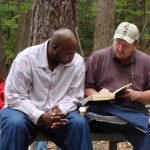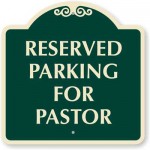Arthur and Bob
Arthur at “The Voice of One Crying Out in Suburbia” has a problem. You see, in his latest post “Be Like Bob,” Arthur describes a church leader named Bob who helps a church begin serve God and serve others for themselves.
According to Arthur, the church begins to take part in living the gospel (that’s what it is, by the way), that soon Bob doesn’t do everything anymore, and he can work and support his family and others without needing monetary support from the church.
So, what is Arthur’s problem? He wants to follow a guy like Bob, but he doesn’t find many “Bob’s” in the church today. (By the way, I like following people like Bob.)
Here is how Arthur describes Bob and his work among the church:
After a year or two [of Bob equipping and training others to serve], perhaps 4 or 5 of the men of the church have advanced in maturity and are regularly ministering to the needs of the believers in this local church. The church recognizes these men as elders and they begin to shoulder an increasing load of the ministry in the church, again both to “members†and to the community in addition to their secular jobs. As the newly recognized elders help to minister and equip in the local congregation, Bob has more time freed up and is able to work his regular job on a full-time basis. Bob no longer accepts a regular salary from the church. The $400 the church had been paying Bob while he was laboring in ministering and equipping is now freed up so the local church decides to donate all of this to local and global ministries engaged in spreading the Gospel and works of mercy. Bob spends more time at his “regular†job and thus more time among unbelievers than in his office at the church.
Read Arthur’s post… compare it to what you find in Scripture. (I can find Bob in Scripture.) Compare it to what you find in the church today.
Where are all the Bob’s?
By working like this
As many of my regular readers know, I do not believe that it is scriptural to pay a salary to a pastor/elder (or other localized Christian) because of their position in the church. (I do believe that sharing or honoring in response to anyone’s teaching, leading, or service is appropriate at times.) When I wrote a series of posts on this topic, someone asked about a particular phrase in Acts 20. I wrote the post “By working like this” about 3 years ago in response to that question.
——————————————————————
Last October, I wrote a series of posts where I argued that paying a salary to an elder/pastor because of their position cannot be supported from Scripture. The summary to the series, and links to the other posts in that series, can be found in the post “Summary – Should elders/pastors be paid a salary?”
Recently, there have been some really good anonymous comments left in some of the posts of that series. One comment in particular by Jerry deserved further consideration. Jerry writes:
He [Paul] says that they (and he) must work hard to support the weak, embodying the principle of giving over receiving as spoken by Jesus and modeled by Paul in his providing for the men with him from his enterprises. I think you are reading more into outws in Acts 20:35 than can be substantiated from the greater context of scripture. Were they to work “exactly†as Paul did they would all have to enter the craft of tentmaking. Paul clearly argued that there were some in ministry positions who had the right to earn their living from the gospel (1 Cor 9:14). Paul didn’t assert this right, this is to his credit, but Paul’s example here cannot be exegetically construed to be prescriptive to all ministry workers lest a number of problems with the text arise.
The primary passage that Jerry references is Acts 20:33-35:
I coveted no one’s silver or gold or apparel. You yourselves know that these hands ministered to my necessities and to those who were with me. In all things I have shown you that by working hard in this way we must help the weak and remember the words of the Lord Jesus, how he himself said, ‘It is more blessed to give than to receive.’ (Acts 20:33-35 ESV)
In context, this is the end of a speech that Paul gives to the elders of the church in Ephesus. This is a very valuable passage, because it is one of the few places in Scripture where elders are specifically addressed. (By the way, one other passage is 1 Peter 5:1-4.)
Jerry raises the question concerning the referent of “outws” (οὑτως), which is an adverb that is generally translated “thus” or “in this manner”. It is translated “in this manner/way” in the ESV, NASB, and NET and “like this” in the NKJV and HCSB. Of course, the question is, “To what does ‘outws’ refer?” The NIV interprets the reference for us: “this kind of hard work”. But, is this a valid interpretation?
In verses 33-34, Paul says that he has demonstrated to these elders how he “worked hard with his hands” while he was among them. He did this in order to provide for himself and for others and so that he would not covet other people’s money – at least, according to the text this is why he did it. Notice that Paul does not mention how he worked. He does not mention that he made tents. That information is not necessary for his argument. What is necessary is that he worked hard with his hands in order to provide support for himself and others.
Next, in verse 35, Paul says that he showed the Ephesian elders (“you” – his audience was composed of elders from the church in Ephesus) that it was necessary for them to work “like this”. Literally, this verse reads, “In all things I showed you that it is necessary to help the weak by working hard like this…” The phrase “by working hard like this” is fronted both in the Greek text and in our English translations for emphasis. How do elders help the weak? Paul’s answer is, “By working hard like this”. Of course, this still brings up the question, “To what was Paul referring when he said “like this”?
From the context, Paul was using his own work (“with his hands”) as an example to the elders. They were to work in the same manner – that is, “with their hands in order to provide for themselves and others”. Again, Paul does not mention tentmaking in this argument, but it was not his emphasis. He did not expect nor encourage the elders to begin making tents like he did. However, he did expect each of them to “work hard with his hands”. This is the reference for “outws” – “in this way” or “like this”.
The remainder of verse 35 reinforced what Paul is saying. By working hard with their hands, the elders would be able to support themselves and to have enough to help others, especially those who are weak. Therefore, they would be remembering and living out Jesus’ words: “It is more blessed to give than to receive.”
By the way, this is not a nice suggestion on Paul’s part. Instead, he says, “It is necessary”. This is one of the strongest imperatival forms in the New Testament. Paul could have said, “It is fitting” or “It is proper”, which carries less weight. However, he did not. He said that it is necessary for elders to help the weak by working hard with their hands in order to support themselves and others.
One more quick note. As I’ve said before, I do not think that paying a salary to a pastor/elder because of their position is scriptural. First, this does not mean that I think the practice is always wrong. A practice does not have to be in Scripture to be appropriate at times. However, I do not think a salaried pastorship is necessary, and I think it is detrimental in many contexts. This does not mean that I condemn every pastor who receives a salary. In fact, I do not even bring up the topic with pastors that I personally know who receive a salary. Why? Because for the most part they are very godly people, interested in serving God and the church. Also, while I think they are wrong in their understanding of this topic, I also recognize that I could be wrong. In humility, I prefer to let God sort that out, and live in unity with other believers instead of causing division. Finally, I do believe that giving financially to pastors/elders is scriptural, when it is done by individuals in response to that person’s teaching, leading, and other forms of service. I have gratefully accepted money from people many times, as well as other types of support – that is, financial and non-financial. I have also been the recipient of hospitality from many different brothers and sisters in Christ. I also give cheerfully to others in response to their needs or in response to their teaching, leadership, and other forms of service and offer hospitality to others. “Money” is not the issue in my argument. Instead, the issue is whether or not a pastor/elder should be paid a salary based on their position as pastor/elder.
Expectations for Leaders
Felicity at “Simply Church” is working through a series on leaders.The series has been very good so far. She is asking good questions that believers/churches should consider as they seek to recognize/appoint/follow leaders.
One of her posts asks “What do we expect of our leaders?”
Since Rick recently requested (in a comment) that I continue writing about my understanding of leadership among the church (and the implications of having official elders), I thought I would share my comment on Felicity’s post here:
I expect the same thing from leaders that I expect from everyone else: living their lives in demonstration of the gospel of Jesus Christ. The people that I follow (imitate, learn from, whatever) – that is, leaders – I do not follow because they have been chosen or recognized or appointed, but because they are consistently obedient to Jesus Christ and they are a good example of living in him through the Spirit.
What do you think? What do you expect from leaders?
A wolf in sheep’s clothing?
Do you see the young, good looking guy in the picture? No? Well, you do see the guy in the picture, right?
Well, that guy – whether he is young and good looking or not – can be a wolf in sheep’s clothing. At times, he can teach and lead in a way that is contrary to God’s will. It’s true. He’s not perfect.
That guy in the picture is one of the reasons that I’m glad that our church has recognized (appointed) several people to be pastors/elders/overseers.
You see, if the church relied on that guy in the picture, they would be headed the wrong way at times. But, the church can now follow the example of several different people. Sometimes, one or more of them may go astray. But, the other elders (and the other brothers and sisters for that matter) are there to say, “Whoa! Wait just a minute. Are you sure that you’re headed in the right direction? I don’t think God wants us to follow you there.”
It’s awesome how the Holy Spirit works through my brothers and sisters to bring me back in line with the will of God when I begin to stray. Again, I’m glad I’m not the head guy… the senior pastor… the guy in charge. I’ll leave all that to Jesus, and keep following him together with my brothers and sisters.
Dave Black Comments on Senior Pastors
On his blog (Saturday, January 8, 2010 at 6:30 p.m.), Dave Black mentions a review of Strauch’s Biblical Eldership.
The reviewer agrees with many of Strauch’s conclusions, but disagrees with one point in particular. While Strauch argues against a “senior pastor” position, the reviewer believes a “senior pastor” positions is legitimized based on the roles of Timothy and Titus in the “pastoral epistles” and based on the angles of the seven churches in Revelation 2-3.
Dave responds:
One of the most important lessons in New Testament Introduction courses is a discussion of the so-called Pastoral Epistles, which, of course, were neither written to nor about pastors. It is clear, for example, that the church which Timothy was sent to serve (Ephesus) already had elders — Paul had met with them earlier in Miletus. As for Titus, he was charged with appointing elders in every city on Crete. As I have often said to my students, it is high time we put the term “Pastoral Epistles” out to pasture once and for all. As for the “angels” of the seven churches of Asia Minor in Revelation 2-3, considering the consistent use of the term angelos in the book of Revelation, it seems likely that the term is being used to refer to angelic beings in these 2 chapters.
It would seem, then, that the title of senior pastor is in fact inconsistent with the concept of the plurality of elders, assuming that the eldership is, as Strauch argues, non-hierarchical. In fact, I suggest that this is exactly what one would expect when one looks at the twelve apostles of our Lord, none of whom can be said to have held the position of “Senior Apostle.” Of course, one of them, Peter, was a spokesman of sorts for the others on many an occasion, but did this make the rest “Associate Apostles”?
Did you know that “senior pastor” is actually a valid title found in Scriputre? It’s true. It’s used in 1 Peter 5:4 – “chief shepherd” = “senior pastor.”
Does “Double Honor” = “Salary”?
So, does “double honor” in 1 Timothy 5:17-18 refer to a salary? Arthur at “The Voice of One Crying out in Suburbia” takes issue with another blogger’s conclusion in his post “Back to double honor.”
In case you’re new around here, I do not believe that “double honor” in 1 Timothy 5:17-18 refers to a salary. I do not believe that Scripture condones paying a salary to someone in exchange for that person being a pastor/elder or in exchange for that person offering the church some type of service.
But, for those who do believe that “double honor” in that passage indicates a salary, I’d like to ask a couple of questions. The following two passages are very similar – perhaps even parallel – to 1 Timothy 5:17-18.
One who is taught the word must share all good things with the one who teaches. (Galatians 6:6 ESV)
Does the passage above indicate that we should pay a salary to all teachers? Why or why not?
We ask you, brothers, to respect those who labor among you and are over you [lead you] in the Lord and admonish you, and to esteem them very highly in love because of their work. (1 Thessalonians 5:12-13 ESV)
In the passage above (which is eerily similar to 1 Timothy 5:17-18), Paul uses the phrase “esteem them highly.” Could that give us a clue as to what Paul meant by the phrase “double honor”? Why or why not?
What do you think?
Fitch: “Leadership” is not biblical
Yes, the title is provocative, but the content is very good. I’m talking about David Fitch’s article “Is ‘Leadership’ Biblical? A Few Reasons to Say ‘No’” at “Reclaiming the Mission.”
By the way, David begins by saying that he is talking about “leadership” in “the way the term has become adopted into the vernacular of evangelical leadership conferences and books.”
He gives five reasons that this type of “leadership” is not biblical:
1. THE WORD “LEADER†ITSELF IS GENERALLY AVOIDED IN THE NT within the context of the church.
2. WHENEVER THE WORD “LEADER†IS USED IN THE NT – IT IS SUBVERTED BY THE CHURCH so that “leadership†takes on the element of leading by character not coercion, by submission not hierarchy in reverence for the Lordship of Christ.
3. JESUS HIMSELF SUBVERTED THE TERM “LEADERSHIP.â€
4. CHRISTIAN LEADERSHIP IS DEFINED BY THE POSTURE OF SUBMISSION – TO THE WORLD THIS IS NOT LEADERSHIP.
5. THE BUSINESS MODELS OF LEADERSHIP WILL HANDICAP US FROM LEADING INTO MISSION. (emphasis in original)
Of course, David says that there is a “biblical” form of leadership. You can see that in his “reasons” above. Read his post; there is much more information there.
By the way, it is interesting to see several commenters “agreeing” with David with a “yes, but…” approach.
I’ve been re-mixed
Turnabout is fair play. A reader named Harper took a statement that I made in my post “Why I’m glad not to be that kind of pastor” and turned it around. Then, he used my own strike-through “re-mix” style. (Unfortunately, he couldn’t post this as a comment, so he emailed it to me and I’ve published it here.):
—————————————————————-
Here is the first installment of “Scripture Alan……As We Live See It #1â€:
Actually, I don’t think the problem is with being a “pastor†per se, but with the unscriptural expectations control that many Christians leaders (especially elders or “pastorsâ€) place on demand over those they recognize as leaders followers (especially elders The Church or “pastors†“sheepâ€).
—————————————————————-
By the way, I think the church needs a “course correction” (punt and do-over?) in the area of leadership. And, I believe that this course correction must come from both directions: both from those who are recognized as leaders and from those who are not recognized as leaders.
It’s not my kingdom
It’s not my kingdom, and it’s not my church. I think every Christian would agree with that in principle, but some often act as if it is their kingdom and their church.
James and John asked if they could sit at Jesus’ right and left hand while he ruled his kingdom. Jesus said, “No. That’s not the way my kingdom works.” But, I think, others have decided that James and John were right and Jesus was wrong. They have tried to place themselves at Jesus’ right/left hand, even if only over their local fiefdoms.
I’ll be honest… it is tempting to place yourself (or let yourself be placed) in a position of authority.
But, how do we make sure that we are not putting ourselves in a position that only Jesus can hold?
Why I’m glad not to be that kind of pastor
I wrote the post “Why I’m glad not to be that kind of pastor” in response to another blog post. But, this post explains much about my understanding of edlers/pastors. I think it is a good post to closer out the week of my “Dangerous Sunday” series.
——————————————————
Why I’m glad not to be that kind of pastor
A few days ago, John Smulo at “smulospace” wrote a post called “Why I’m Glad Not To Be A Pastor Anymore“. John says that he is disillusioned with the “predominant models of ‘pastor'” and that he’s glad that he’s not in that position anymore because:
- I get to spend so much more time with my family.
- I get to spend more time with friends.
- It’s great to just be a married guy with kids, who owns a website and blog design business.
- I have time to be involved in my community through our local Rotary Club.
- I needed to recover from church burnout.
I understand what John is talking about, but not from experience, only from observing other “pastors”. Actually, I don’t think the problem is with being a “pastor” per se, but with the unscriptural expectations that many Christians place on those they recognize as leaders (especially elders or “pastors”). For example, a few months ago in a post called “Responsibilities and Expectations of Elders“, I published a standard job description that is published by a denominational agency:
- Plan and conduct the worship services; prepare and deliver sermons; lead in observance of ordinances.
- Lead the church in an effective program of witnessing and in a caring ministry for persons in the church and community.
- Visit members and prospects.
- Conduct counseling sessions; perform wedding ceremonies; conduct funerals.
- Serve as chairman of the Church Council to lead in planning, organizing, directing, coordinating, and evaluating the total church program.
- Work with deacons, church officers, and committees as they perform their assigned responsibilities; train and lead the deacons in a program of family ministries.
- Act as moderator of church business meetings.
- Cooperate with associational, state, and denominational leaders in matters of mutual interest and concern; keep the church informed of denominational development; represent the church in civic matters.
- Serve as chief administrator of the paid church staff; supervise the work of assigned paid staff workers.
In that post, I stated that these (for the most part) are expectations placed on “pastors” by church organizations and many believers, but they are not scriptural expectations or requirements.
Here’s the thing… I’m an elder… I pastor… but I’m not “that kind of pastor”. And, I’m glad not to be that kind of pastor. Why?
1. No one expects me to be obedient for them, and I’m not paid to be obedient for others. Everyone who is part of the church recognizes that it is their responsibility to serve, teach, care, evangelize, etc.
2. When I talk about the difficulties of working, having a family, and serving other people in the church and outside the church, I’m not talking from theory. No. I actually do all of those things. I work. I have a family. I serve other people in the church and outside the church. By the way, my example also removes excuses when someone would want to say, “But I don’t have time.”
3. No one wonders if I serve them only because I’m paid. They don’t wonder what would happen if another church offered me more money. They don’t wonder if I’m part of them only because they hired me.
4. I’m free to do whatever God leads me to do. My time is not taken up with meetings and planning and other “duties and responsibilities” that may take time away from serving or loving people that God brings across my path.
5. I’m part of the church. I’m not the main guy or some outside expert or professional. I’m just another brother who is struggling in his walk with Christ just like everyone else. Hopefully, since I’ve been recognized by the church, my walk is at least a little more mature and is a good example for others to follow. This also means that I’m free to say, “No”, if someone asks me to do something.
6. The church are my friends. I don’t have to keep people at arm’s distance. I don’t have to worry about job security if people find out that I’m not perfect or I don’t have all the answers.
7. Since I’m not the only one responsible for teaching – all of us are responsible to teach – then I’m also able to learn and be encouraged by the church. I can exercise my spiritual gifts in serving others and others can exercise their spiritual gifts as well. I don’t have to try to be (or pretend to be) a “jack-of-all-trades”.
There are so many other reasons why I’m glad not to be “that kind of pastor”. But, primarily, I’m glad that I’m actually able to pastor (that is, care for people), without being required to handle administrative, organizational, and structural requirements that other “pastors” are required to deal with.










